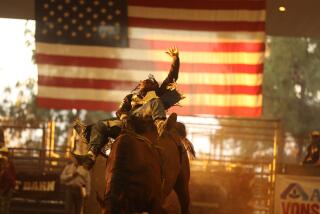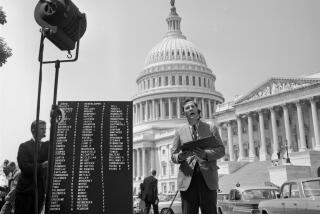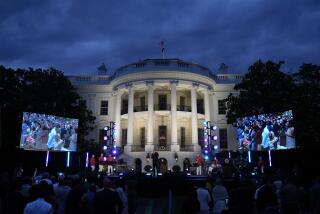African Americans Find Sustenance at Juneteenth
- Share via
LAKE VIEW TERRACE — Although Stephen and Mika Williamson learned about Juneteenth only recently, the Agoura couple attended Saturday’s celebration at Hansen Dam Park for the first time to begin the cultural education of their two young children.
“I want to try to teach my kids more African American history than my parents did to me,” said Stephen Williamson, holding 18-month-old daughter Stephanie in his arms.
His 2-year-old son, Tyler, giggled and tumbled between his mother’s legs.
“It wasn’t that my parents had any ill will, but they just did not know,” Stephen said. “But I think, as our generation gets older and more aware, the truth is coming out more and more.”
The Williamsons were among about 100 Juneteenth Festival supporters who traveled from as far away as Ontario and Long Beach to listen to soul, jazz and gospel musicians, browse the booths of African jewelry and clothing and eat shaved ice, barbecued chicken and other foods.
The holiday commemorates a little-known twist in American history. Although President Abraham Lincoln issued the Emancipation Proclamation on Jan. 1, 1863, freedom did not come to all slaves until more than two years later. The news finally reached Galveston, Texas, on June 19, 1865, when Union soldiers led by Maj. Gen. Gordon Granger proclaimed sovereignty of the United States over Texas and the freedom of all slaves.
The reasons for the delay are uncertain--some myths say a messenger was murdered on his way to Texas, others say that the news was deliberately withheld by slave masters to maintain the labor force on plantations. Still others contend that federal troops actually waited for the harvest of another cotton crop before going to Texas to enforce the Proclamation.
Freedom festivities have been organized around the country ever since. Juneteenth became an official holiday in Texas in 1980.
Richard Sample of Pacoima said living in the Valley is sometimes difficult for African Americans because the community is small and scattered.
*
“I came because I wanted to have my son understand what Juneteenth is all about because he was not taught about it in school,” said Sample, 37. He and his son, Myon, 9, watched a group of young tap dancers perform.
“The schools are 70% Hispanic, so you have big celebrations around Cinco de Mayo, but a lot of the kids just don’t know about this day for us,” he said.
But Darcelle Herring was just happy to be surrounded by other African Americans, no matter the size of the turnout. Traveling from Long Beach with her friend Yolanda Smith for the second annual daylong festival, Herring said she didn’t mind driving a long distance to “celebrate freedom.”
“I came to pay tribute to the slaves,” she said. “And I love to see the beauty in my people.”


